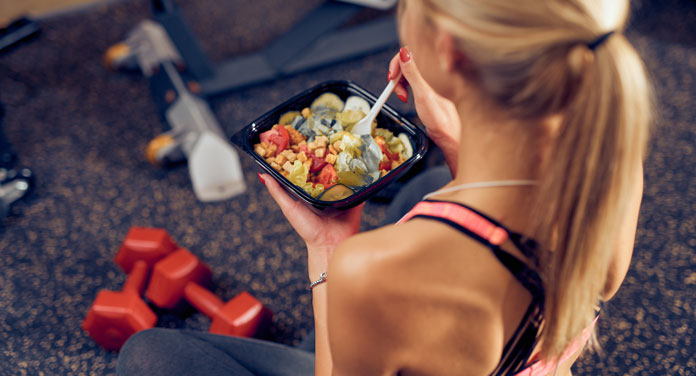You watch your diet. You exercise regularly. But the pointer on the scale just won’t move down? Then you should definitely read on now. Because the reason could be your metabolism.
Metabolism: Scientifically, it is a series of life-sustaining chemical transformations that take place in the cells of living organisms. That sounds highly complex and really doesn’t seem like we can exert much influence over this complicated process. But that’s not true!
Here are the 20 best tips and tricks to get your metabolism up to speed and boost your fat burning so that you too can reach your weight goal faster and, above all, permanently.
1. Eat Enough
If you want to weigh less, you have to eat less, right? Sounds obvious, but it’s not necessarily so. Not consuming enough calories can cause your body to lose muscle mass, which slows down your metabolism. Additionally, when you eat fewer calories, your body slows the rate at which it burns calories to conserve the fuel it has.
To stay in fuel-speak, under-fuelling is just as risky as over-fueling. When trying to lose weight quickly and noticeably, many people mistakenly believe that eating as few calories as possible is the best solution. Not only can this lead to deficiencies in numerous nutrients as the body receives less nutrition overall, but it can also have the opposite effect on weight loss. Instead of cutting calories like crazy, use the following simple diet and exercise hacks that can help you lose weight quickly and safely without hurting your metabolism.
2. Build Muscle
Even if you’re not doing anything, your body is burning calories all the time. 60 to 80 percent of the calories you burn each day are burned just to keep you alive. This is the result of various scientific studies. Studies show that resting metabolic rate and total calorie expenditure are significantly higher in people with more muscle mass since every pound of muscle uses about six calories per day not to disappear. This means that if you can build and maintain just five pounds of muscle, over the course of a year you will burn as many calories as there are three pounds of fat.
3. HIIT Workouts To Build Muscle Mass
If you’re looking for a weight loss workout, weights and cardio alone won’t cut it. To boost metabolism and lose weight, nothing beats interval training. A US study found that 20-minute HIIT workouts helped women lose 5.5 pounds more and gain more muscle mass over 15 weeks than women who did long steady cardio workouts.
Find a gym that offers HIIT classes, or turn your favorite cardio workout (like jogging, biking, or even walking) into interval training. Here’s how it works: periods of intense speed (starting at 30 to 60 seconds) alternated with periods of rest (normal speed) for the same duration. Repeat six to ten times to turn your workout into a fat loss booster. As you get better, you can slowly increase the amount of time with increased intensity.
4. Eat Enough Protein Every Day
It’s a very simple equation: when you have more muscle, you burn more calories no matter what you’re doing. Going to the gym is a great way to build muscle, and eating protein can prevent the muscle mass you gain from disappearing and slowing down your metabolism.
Research has shown that protein can increase calorie expenditure by five percent after a meal. This is because protein is more difficult for the body to break down and digest than, for example, simple carbohydrates or fat. So try to include protein in every meal and snack throughout the day.
High-protein foods that boost metabolism include:
- Hard-boiled eggs
- Chicken breast
- ground turkey
- beans
- Beef from the rump or back
Protein needs vary from person to person, but as a rule of thumb, 0.8 to 1 gram of protein per kilogram of bodyweight per day is enough to accelerate weight loss. So, for example, if you weigh 130 pounds, that would be 46 to 58 grams of protein per day for you.
5. Favor Whole Grain Products
The body needs more energy to break down whole grains than refined and processed grains, such as in the light-colored flour typically used to make bread and pasta. You can help increase your metabolism by consuming foods that your body has to work harder to digest. Researchers in a US study found that eating whole foods increased post-meal energy expenditure by 50 percent compared to eating processed foods.
The preferred foods that boost metabolism are whole grains that are also high in fiber, such as:
- Brown rice
- Oatmeal
- Quinoa
- Whole grain bread
6. Getting Enough Sleep
Even if you still feel fit at 11 p.m. – you should go to bed earlier in the future. A study in Finland looked at a group of identical twins and found that in each pair of twins, the sibling who got less sleep had more visceral fat. Even half an hour of extra sleep can make a real difference. So if you’re a regular sleep depriver, don’t be surprised if you gain a few pounds without even eating an extra bite.
A lack of sleep can lead to a number of metabolic problems. For example, not getting enough sleep can cause you to burn fewer calories, not be able to control your appetite, and increase cortisol levels, causing more fat to be stored.
Not getting enough sleep — less than seven to nine hours a night for most adults — also leads to impaired glucose tolerance, which is your body’s ability to convert sugar into energy.
A riotous party, a late night at the office—we all have those nights when we don’t get enough sleep. But when sleep deprivation becomes normal, sleeping in an extra hour or two can be more effective in terms of fat loss than waking up earlier to hit the gym in the morning.
7. Cut Out Naps
Research shows that people burn fewer calories when they sleep during the day and stay up later after the sun goes down. To arrive at this result, researchers from the University of Colorado studied 14 healthy adults for six days. For two days, the study participants slept at night and stayed awake during the day.
Then they reversed their routine to mimic the rhythm of the night owls. When the participants slept during the day, the researchers found that they burned 52 to 59 fewer calories than when they slept earlier in the evening — likely because the schedule messed up their circadian rhythm, our internal clock, which plays an important role in metabolic function. If you have no choice but to sleep during the day, try cutting 50 to 60 calories out of your daily diet.
8. Eat High-Fiber Beans
Beans are not only a great source of plant-based protein, but they’re also packed with soluble and insoluble fiber. The digestion process of the fiber and protein in the beans burns extra calories. Also, both types of fiber lower insulin levels after digestion, causing the body to store less fat. You can think of each bean as a little metabolism pill.
One study found that people who ate ¾ cup of beans a day weighed 6.6 pounds less than those who didn’t — even though the bean eaters ate an average of 199 more calories a day.
9. Reduce Stressors
According to an American study, stress can cause the body to process food less quickly. What’s more, the foods we crave when we’re stressed are usually unhealthy, greasy, and high in sugar.
Researchers assume that food cravings in combination with a metabolic rate that slows down due to stress can lead to significant weight gain.
The trick to boosting your metabolism: fight stress with laughter. Research shows that laughing and smiling frequently reduce stress hormone levels.
10. Ensure Vitamin D Supply
If there’s one dietary supplement you should take, it’s vitamin D. The body needs vitamin D to maintain the muscle tissue where metabolism occurs. But researchers estimate that only about 20 percent of the population gets enough of the power vitamin through their diet. And this is despite the fact that a 100 gram serving of salmon covers 90 percent of the recommended daily value (400 IU).
Good food sources of vitamin D include:
- Fat-free fish such as herring or Salmon
- Avocados
- Eggs
11. Drink A Glass Of Water When You Wake Up
Drinking a glass of water shortly after waking up is one of the easiest and cheapest ways to give your metabolism a jolt.
Why? During sleep, your body’s metabolic function slows down. Unless you’re waking up in the middle of the night to drink some water, you’re not ingesting any liquids. At best, you should fully rehydrate before stressing your body with other foods or beverages. The result is less gas, more energy, and less appetite.
Coffee fans should make this somewhat abstract phrase their morning motto: “Rehydrate, then caffeinate!”
12. Drink More Water
According to a US study, increasing fluid intake can increase the rate at which healthy people burn calories. After drinking about two large glasses of water, the participants’ metabolic rates increased by 30 percent. Researchers estimate that increasing daily water intake by 1.5 liters over the course of a year can burn an additional 17,400 calories – that’s a weight loss of about five pounds!
13. Pack Snacks For On The Go
You should always be prepared for a busy or unpredictable day by keeping healthy snacks at your desk, in your bag, or in your car. If you have to skip breakfast, lunch, or even dinner, you always have a healthy alternative to keep your energy levels up. No more running to the machine for chips or sticking your fingers in the candy bowl.
Appropriate snacks to keep the metabolism running are:
– Almonds or other unsalted nuts
– Apples
– Bananas
– Chia bars
– Protein bars
– Fruit and nut bars
14. Cut Down On Diet Products And Artificial Sweeteners
Sure, zero calories sound tempting, but consuming Diet Coke & Co. can still get in the way of your weight loss goal and your dream of a flat stomach. Various studies have shown that drinks with artificial sweeteners can negatively affect the body’s natural metabolic response to sugar and increase appetite. It’s no wonder that diet drinks are increasingly being blamed for weight gain, metabolic disorders, and a host of other diseases.
15. Eat Nuts
A 2003 study showed that a low-calorie, high-almond diet can help people lose weight. The good monounsaturated fats in almonds not only have a positive effect on insulin levels, scientists say, but also make those trying to lose weight feel full, which means they’re less likely to overeat. That means for you: fill the pantry with almonds, walnuts, and nut butter!
16. Eat Whole Foods
The smoothie revolution has hit us hard and many people are drinking their green leafy vegetables by the gallon. But the supposedly ingenious liquid food intake has a major disadvantage.
Because the breakdown of food and the associated absorption of nutrients, which is one of the main tasks of the metabolism, is carried out in a smoothie mixer, blender, etc. The result: the body needs much less energy than if we eat fruit and vegetables in their natural state, the solid form would take to us.
That’s not to say smoothies aren’t great for weight loss, too. However, by eating fish, lean meat, vegetables, and fruit, you increase TEF (the “thermal effect of food,” in other words, post-meal metabolism) and burn more calories during digestion.
17. Eat Salmon
There is many fish in the sea, but salmon is the one you should fish out if you want to boost your metabolism. Thanks to its high content of omega-3 fatty acids, salmon has an anti-inflammatory effect on the thyroid gland, the function of which controls our metabolism. In fact, one study looked at the effects of weight loss and seafood consumption and showed that consuming the high-fat sea creature was better at reducing inflammation than other fish, such as cod, or even ingesting fish oil.
18. Eat Iron-Rich Foods
More than 1 in 5 women is affected by iron deficiency. Essential mineral deficiencies can occur in a variety of ways, such as B. Tiredness and anemia (low blood count). However, iron deficiency can also take a toll on your metabolic health. Because your body can’t work as efficiently to burn calories if it doesn’t have what it needs. However, if you treat the iron deficiency with adequate iron intake, you can lose weight and improve metabolic parameters such as blood pressure and cholesterol levels, according to a study.
Iron-rich foods to add to your diet to boost metabolism include:
– 1 cup of lentils, 36 percent of the daily requirement
– 500 grams of ground beef, 15 percent of the daily requirement
– 1 cup of spinach, 24 percent of the daily requirement
19. Eat Three Meals A Day
Bodybuilders swear to eat every few hours to build muscle. But if you want to lose weight, you’d better stick to three meals a day.
In one study, two groups of men were asked to eat in a way that made them gain weight. One group split the calories into three small meals and several snacks, group number two ate the same amount of calories in three full meals.
There was weight gain in both groups. Belly fat, however — the dangerous type of fat that increases your risk of cardiovascular disease — increased only among participants in the group who ate snacks in addition to smaller meals.
20. Drink Less Alcohol To Increase Fat Burning
If you drink in moderation every now and then, it shouldn’t affect your weight too much. However, if you make it a habit, drinking alcohol can slow down your metabolism.
Why? When your body has a cocktail to break down, it prioritizes breaking down alcohol over processing any other food you’ve already eaten that should be digested. This slows down your entire metabolic process. If you fancy a drink, stick to low-calorie drinks. Also helpful: Alternate each glass of alcohol with a glass of water to slow your pace, and it’s best to stop after two drinks. If possible, avoid ordering high-calorie foods such as fries and burgers with your beer.
However, there is good news for all wine lovers: Wine in moderation can have numerous benefits, including weight loss!





